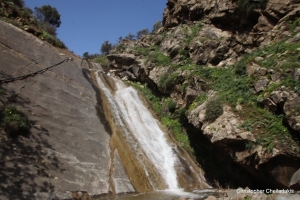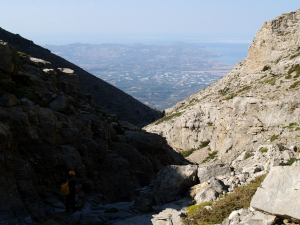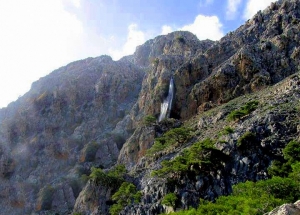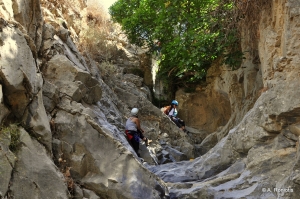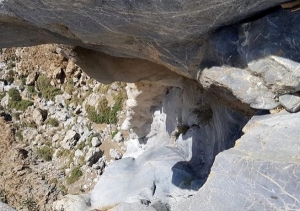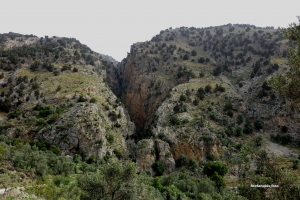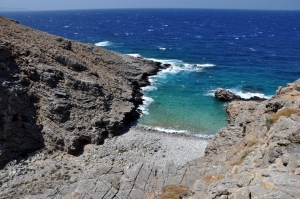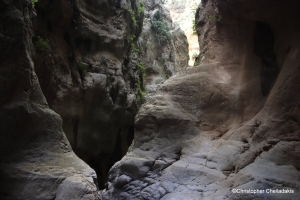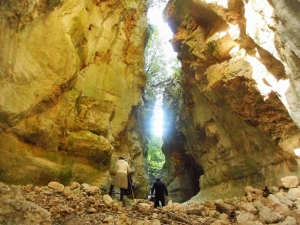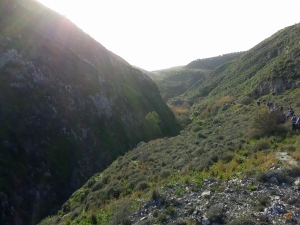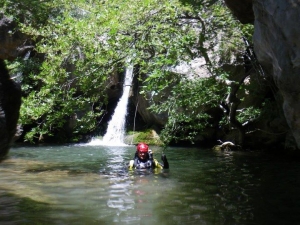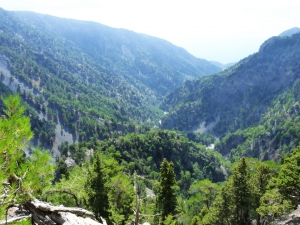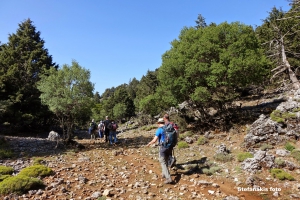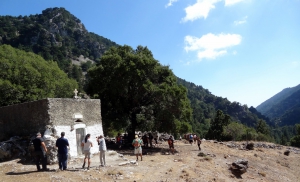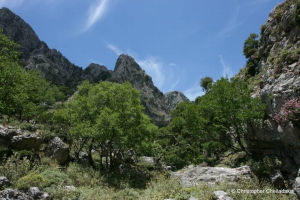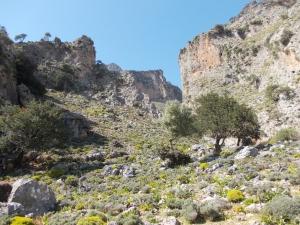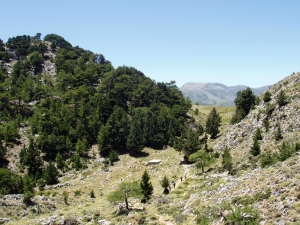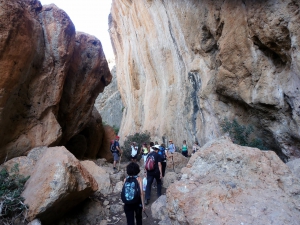In the village Karavados in prefecture Heraklion lies a small gorge that is completely unknown, Argoulidias gorge. Its name is taken after the many wild olive trees (called argoulides in Cretan dialect) found in the canyon, the vegetation of which is complemented by carobs, Nerium oleanders and many plane trees.
The gorge of Kamares, known as Kamaraiko Gorge, is the largest canyon in the area of Kamares village of Pyrgiotissa province on the south side of Psiloritis. We meet its imposing exit in a steep turn a few meters west of the village, on the main road to Lochria.
Gerakia is a technical gorge of the range Asterousia in the area of Agios Ioannis, near Kapetaniana, with a southern orientation. It is one of the many parallel technical gorges of the area and crosses a beautiful pine forest.
The very beautiful gorge of Sykia is actually the easternmost gorge of the province of Sfakia and is formed north of the village Rodakino. It is a technical canyon, thus crossing it requires technical equipment, as there are more than 10 steep descents (waterfalls) secured by a relay from the speleological associations of Crete.
The wild canyon of Agia Paraskevi is located in the Asterousia Mountains and on the borders of the village Paranymphi. It is called the little "brother" of the adjacent imposing and most famous Ambas Gorge, as both of them have the two highest waterfalls of Heraklion prefecture.
The Gorge Farangouli at Voriza is located in Psiloritis massif, in the area of the village Vorizia. It is one of the three parallel canyons of the area, with the most famous of all being the great Gorge of Vorizia. The shortest and most unknown is Farangouli, which starts in the village houses and climbs up steeply.
Chalkomatas or Charkomatas Gorge is located near the village Chamezi in Sitia Province and starts from the area where a dirt road starts ascending to the temple of Prophet Elijah and the fortress Liopetro. The vegetation in the gorge is low and the geological formations of limestone are impressive.
The Gorge of Pastrikos is a small gorge formed on the north side of Asterousia, in the wider area of the village Panagia. It is technical, i.e. it requires special equipment for canyoning. It starts from a small plateau where there is a temple dedicated to Saint Cyril.
The small, but beautiful, Kaliakoudes Gorge is formed in the area between the villages of Paidohori, Nio Chorio and Machairi in the province of Apokoronas, Chania. It is basically a continuation of the stream of Skotini, which constitutes a tributary of the River Kiliaris. The canyon is only 1.5 km long, it has about 6 rapels and the entire length of the gorge requires the use of technical canyoning equipment (ropes). The highest of the descents is about 8 meters high.
Litheos Potamos (Lethean River) collects water from the basin of Gergeri and Panassos in the south-eastern roots of Psiloritis. It continues its course as a wide river from Apomarma, during which many vertical streams meet the main stream. Throughout its course one meets many dilapidated watermills, while we also encounter traces of the ancient aqueduct that transferred water from Gergeri to Gortyn.
The small gorge of Petinos or gorge Anavryta is shaped northwest of Lithines village, Sitia province. It is a technical gorge, meaning that crossing it requires canyoning equipment, as along it's course it forms about 12 waterfalls, with the highest reaching about 20m.
Tripiti is the second large gorge parallel to Samaria gorge and, like Klados, the trail heading to its entrance also starts at Linosseli spring. In order to approach its entrance there is a dangerous passage where you risk getting stuck, so that you can neither walk on nor turn around and go back. Therefore, you should never attempt to cross this place it without the escort of an experienced hiker.
The canyon Kavis is one of the longest and wildest of Sfakia area and despite located next to Chora Sfakion, it remains unknown to many people who usually just enjoy swimming at Iligas. The riverbed is dry almost always, except after several hours of rain. Apart from the main stream, in Kavis fall other 5 sub-gorges, extremely wild.
The proposed trekking route in the canyon starts from Niato Plateau (near Askifou Plateau) and runs along the European trail E4. You initially meet the abandoned village of Kali Lakki. From here starts the canyon, which is one of the greenest gorges in Crete, with incredibly interesting flora. Oaks, cypresses, and pines are the main trees in Sfakiano Gorge.
The canyon of Asfendou is one of the many gorges in Sfakia province, starting from deserted hamlet of Asfendou that currently houses some local sheep herders. Along the canyon runs a passable but steep trail, parallel to the streambed. In many places the Libyan sea is visible.
Its exit is located in the village Nomikiana, Sfakia province. In Chionistra there are two different streams in calcareous soils which after one hour walking each merge to form the gorge of Kapni. The canyon is quite long and walking in it takes about 4 hours. It is one of the difficult and dangerous gorges of Crete with craggy riverbed which in some places creates dry waterfalls and requires climbing.
One of the many parallel canyons of the wider area of Fragokastelo. It is a small canyon (2km long) starting from the beautiful plateau Manikas and ending at the seaside village Skaloti after 1:30 hours hiking with steep slopes.
Gorge Perdikaris is located between villages Miriokefala and Argoules, along the borders of the prefectures of Rethymnon and Chania. It is a rugged canyon with steep gradients, low vegetation and large opening throughout its length.
The Gorge Fygou is a small, but very beautiful short canyon located near Sougia and is a sub-gorge of the popular gorge of Agia Irini. From this narrow passage the rebels of the area escaped to Sfakia mountains during the several revolutions (hence the name Fygou, i.e. escape).










